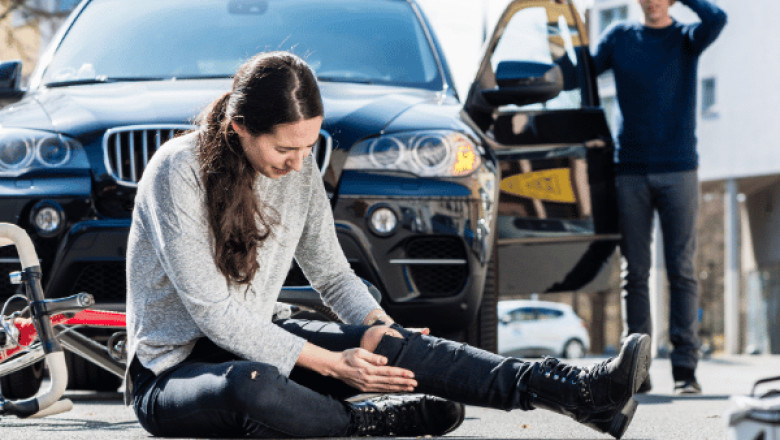views
You’ve just been in a crash in Tempe. The other car’s fender is smashed. Your heart is racing. And out of instinct—or politeness—you say, “I’m so sorry.”
It might feel like the right thing to do. But in the legal world, those two words can come back to haunt you.
Arizona law doesn't automatically treat apologies as admissions of guilt. But that doesn't mean you're in the clear. Insurers and defense attorneys know how to spin what you said, when you said it, and how it might be interpreted later.
If you’ve already found yourself in this situation—or want to avoid it—understanding the legal weight of post-crash conversations is crucial. For further guidance, reach out to a Tempe car accident lawyer to protect yourself from these common pitfalls.
Why “I’m Sorry” Gets Twisted in the Legal Process
Arizona follows a fault-based insurance system, which means the person responsible for causing the crash (and their insurance company) is financially liable for injuries and damage.
When determining fault, every statement you make matters—especially if it can be interpreted as an admission.
Here’s the problem: even if you weren’t at fault, a simple apology can:
-
Be recorded by the other party
-
Show up in the police report
-
Be repeated by witnesses
-
Be used in insurer notes and claim files
This doesn’t mean that saying “sorry” proves you caused the crash—but it gives the other side leverage in making that argument.
What Arizona Law Actually Says About Apologies
Arizona has a partial “apology law,” but it’s limited in scope. Under Arizona Revised Statutes § 12-2605, certain statements expressing sympathy or compassion after an accident are not admissible in court as evidence of liability.
But here’s the catch: if you say something like:
“I’m sorry I didn’t see you,” or
“I shouldn’t have run that light,”
—then you’ve crossed the line from sympathy into admission of fault.
That type of statement can absolutely be used against you in both the insurance process and a lawsuit.
For more on this statute, see azleg.gov or legal summaries available through azcourts.gov.
Real-World Scenarios Where Apologies Cause Problems
Scenario 1:
You’re exiting a Tempe grocery store parking lot and tap the bumper of a car rolling past. No visible damage, but the other driver is upset. You say, “Sorry! I didn’t see you.” That phrase will be used to argue you were inattentive—even if the other driver was speeding or on their phone.
Scenario 2:
After a rainy-day crash near McClintock and Broadway, you get out of the car and tell the other driver, “I’m sorry this happened.” That’s less dangerous legally, but it still opens the door for the insurer to ask: “Why were you sorry if you weren’t at fault?”
Even vague statements can be twisted, especially if recorded or remembered by witnesses.
What You Should—and Shouldn’t—Say at the Scene
✅ DO:
-
Ask if everyone is okay
-
Call 911 and request police presence
-
Exchange insurance and contact info
-
Cooperate with police
-
Stay calm and factual
❌ DON’T:
-
Apologize or explain what happened
-
Accuse the other driver
-
Speculate (“Maybe I was going too fast…”)
-
Discuss injuries unless necessary for medical care
-
Say “It was my fault”—even if you think it might have been
Let the facts and official investigation determine fault. Your job is to stay safe and protect your legal position.
For incident reporting and police contact, tempe.gov lists local precincts and reporting options.
What If You Already Said “Sorry”?
If it’s too late to take it back, don’t panic—but don’t repeat it, either. Document everything you remember about the crash:
-
Direction and speed of vehicles
-
Traffic lights or signs
-
Weather and road conditions
-
What the other driver said or did
If witnesses overheard your apology, it’s best to speak with legal counsel before giving a statement to any insurance adjuster. Even an innocent comment can be weaponized if the other side is looking to shift blame.
How Insurance Adjusters Use Your Words
Insurers are trained to extract useful language from your statement. They often ask:
-
“What happened next?”
-
“What did you say to the other driver?”
-
“Did you admit fault or apologize?”
And while Arizona’s apology protections may apply in court, they don’t necessarily apply in negotiations. Adjusters can still use your apology as a basis to:
-
Reduce your payout
-
Dispute the severity of your injuries
-
Argue comparative fault
That’s why many experienced attorneys recommend never giving a recorded statement to the other driver’s insurer without legal guidance.
Comparative Fault and the Danger of Admitting Anything
Arizona uses a pure comparative negligence system, meaning your compensation is reduced by your percentage of fault.
Even if you were only 10% responsible, that 10% gets deducted from your damages. So if the other driver can point to your apology as evidence of partial blame, your financial recovery could shrink fast.
Worse, if it was a multi-vehicle crash, everyone involved may try to pin blame on someone else—and even a casual “I’m sorry” could drag you into the fault calculus.
Final Thoughts
Saying “sorry” after a crash in Tempe might feel natural—but it carries legal consequences you may not expect. Even though Arizona offers limited protections for expressions of sympathy, those protections don’t always apply in the real world of insurance claims, negotiations, and recorded statements.
You’re not being rude by keeping quiet. You’re protecting your right to fair compensation and avoiding confusion about what actually happened.
If you’ve already apologized—or are unsure what to do after a crash—a car accident lawyer can help you navigate the aftermath with clarity and strategy. Don’t let one moment of instinct cost you the settlement you deserve.






















Comments
0 comment